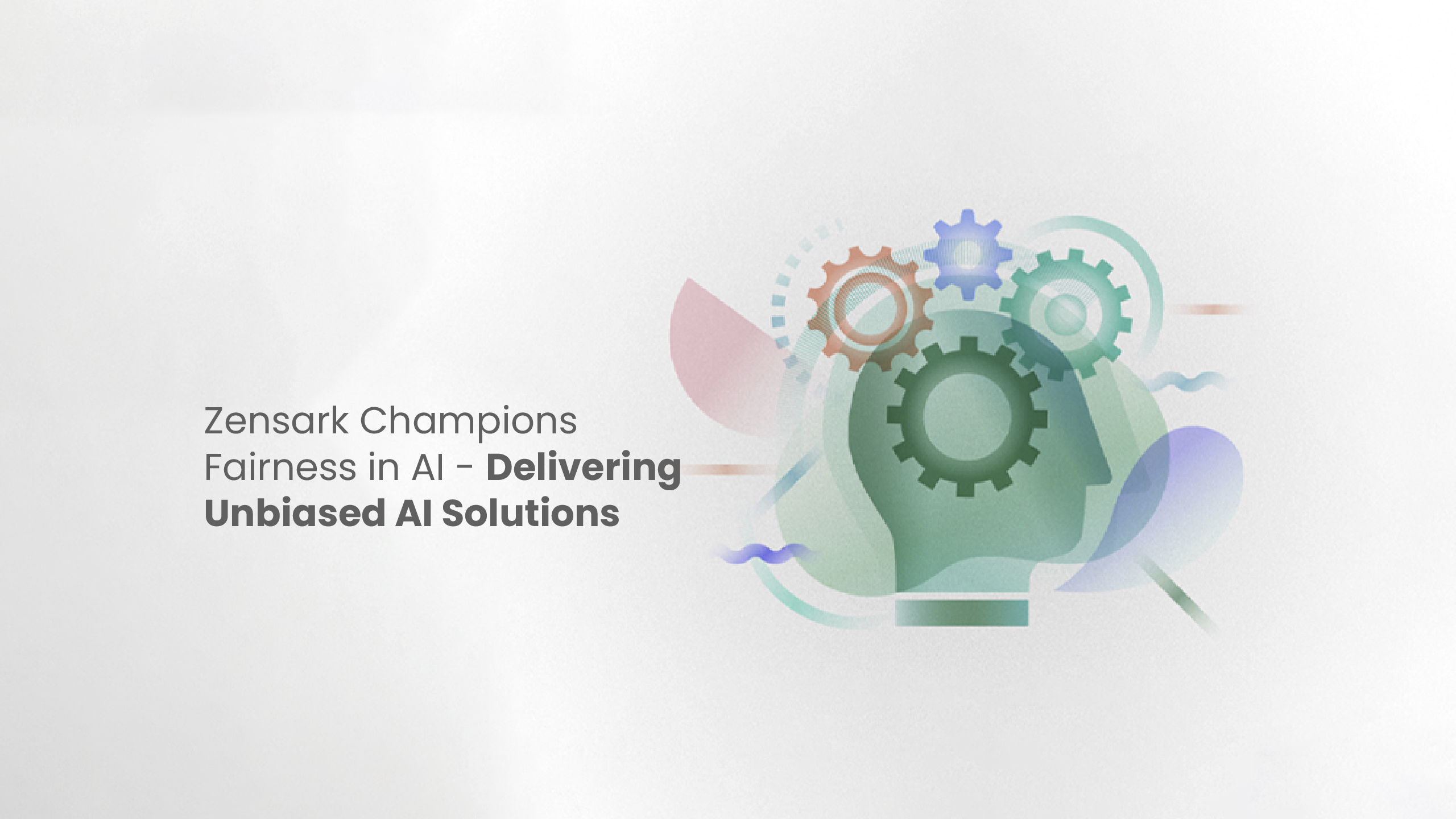Establishing Fairness in AI Startups: Ensuring Equitable Solutions
Zensark AI Division
April 29, 2024

We all know that the power and promise of Artificial Intelligence (AI) is vast, promising to transform industries and redefine our daily lives. However, unlocking this potential hinges on one crucial factor: ensuring that AI systems are developed with fairness and equity at their core. When AI algorithms are biased, they can perpetuate existing disparities and produce discriminatory results.
For startups venturing into the realm of AI, prioritizing fairness isn’t merely a matter of ethics—it’s fundamental to crafting resilient and prosperous products. At Zensark we believe that right from step one, an AI startup can navigate this terrain to achieve fairness and equity in their AI solutions.
Building fair and equitable AI solutions is crucial for any AI startup, not just for ethical reasons but also to ensure robust and successful products. Here are some key steps a startup can take:

Comprehensive Approach to Fairness Metrics and Testing in AI Development:
In the pursuit of fair and equitable AI systems, it’s insufficient to merely presume that algorithms operate without bias. Instead, developers must proactively integrate robust metrics designed to identify and address potential biases in the outputs generated by their AI models. Utilizing sophisticated tools such as counterfactual fairness can offer invaluable insights into whether the AI makes disparate decisions based on sensitive attributes, even when confronted with similar scenarios.
To uphold fairness standards, it’s essential for AI practitioners to establish a routine schedule for testing their systems for bias regularly. This ongoing evaluation process allows developers to pinpoint any instances of bias that may arise over time and make necessary adjustments to their approach. By prioritizing the implementation of fairness metrics and conducting systematic bias testing, AI developers can instill greater confidence in the integrity and impartiality of their technologies, thus fostering trust among users and stakeholders alike.
For example, how many times have we read about bias in resume sorting when candidates apply and the resumes are sorted using AI.

Embracing Human Oversight and Explainability in AI Systems:
In the realm of AI, the principle of transparency is paramount. Rather than treating AI systems as enigmatic black boxes, developers should prioritize the creation of models that offer transparency and interpretability. This entails designing algorithms in such a way that the decision-making process is comprehensible to human observers, enabling stakeholders to grasp the underlying mechanisms by which the AI arrives at its conclusions.
By fostering transparency and explainability, AI practitioners can facilitate human oversight, empowering individuals to scrutinize and assess the decisions made by AI systems. This oversight serves as a vital safeguard against potential biases or errors that may arise within the AI’s operations. When humans can understand and interpret the reasoning behind AI-generated outputs, they are better equipped to detect anomalies, rectify inaccuracies, and ensure that the technology aligns with ethical and fairness standards.
In essence, prioritizing human oversight and explainability not only enhances the accountability and trustworthiness of AI systems but also reinforces the collaborative synergy between humans and machines, fostering a symbiotic relationship wherein the strengths of both are leveraged to achieve optimal outcomes.

Recognizing the Significance of Team Diversity and Training in AI Development:
The composition of the team responsible for crafting artificial intelligence is a critical determinant of the technology’s efficacy and ethical integrity. It’s imperative for AI initiatives to assemble a diverse team comprising individuals with varied backgrounds, experiences, and perspectives. This diversity is instrumental in facilitating early detection of potential biases and blind spots that may emerge during the developmental stages of AI systems.
By bringing together team members with diverse viewpoints and expertise, organizations can foster an environment conducive to robust discussions and rigorous scrutiny of AI algorithms. This interdisciplinary approach allows for a more comprehensive evaluation of the technology’s performance and ethical implications, thereby mitigating the risk of unintended biases or discriminatory outcomes.
Moreover, investing in ongoing training and education for the AI development team is essential to instilling a culture of fairness and ethical responsibility. Equipping team members with a deep understanding of fair AI practices and the ethical dimensions of their work empowers them to navigate complex ethical dilemmas and make informed decisions throughout the development lifecycle.
Ultimately, by prioritizing team diversity and providing comprehensive training on fair AI practices, organizations can enhance the quality, transparency, and inclusivity of their AI initiatives, thereby fostering greater trust and confidence among stakeholders and the broader community.

Top of Form Embracing Transparency and Effective Communication in AI Development:
In the realm of artificial intelligence, transparency and clear communication are indispensable pillars for fostering trust and accountability. Developers must prioritize transparency by offering comprehensive insights into the inner workings of their AI systems, including their methodologies, algorithms, and any inherent limitations they may possess. By providing users and stakeholders with a thorough understanding of how the AI operates, organizations can cultivate an environment of openness and trust.
Furthermore, it’s crucial for AI developers to communicate openly about potential biases that may exist within their systems and the proactive measures being undertaken to mitigate these biases. By acknowledging the presence of biases and demonstrating a commitment to addressing them, organizations can engender confidence among users and stakeholders in the fairness and reliability of their AI technologies.
Effective communication serves as a conduit for building bridges between AI developers and the broader community, facilitating meaningful dialogue and collaboration. By fostering an atmosphere of transparency and openness, organizations can engage users and stakeholders in constructive conversations about the ethical implications of AI and work collaboratively towards solutions that prioritize fairness and inclusivity.
In essence, by embracing transparency and effective communication practices, AI developers can strengthen relationships with users and stakeholders, bolster trust in their technologies, and pave the way for the responsible and ethical deployment of AI solutions in society.
At Zesnark, we work towards ensuring fair AI practices by transparently communicating with all stakeholders at every stage of the development process. The best example of responsible AI development, we can share is the revolutionary respiratory healthcare AI app that we have created
AI HealthTech